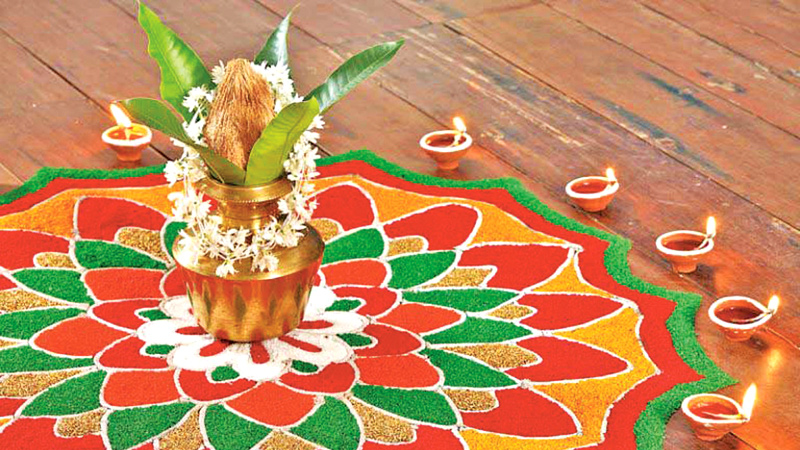Thai (not Thaai) Pongal is essentially a rural peasant's celebration. Farmers in villages are the real heroes for us Easterners. They feed us our staple food rice. They toil hard amidst a lot of hardships. We all know what they are without explaining.
In the Government Calendar, January 15 is marked as a Public, Bank, and Mercantile Holiday and referred to as Tamil Thai Pongal Day.
As we know, Pongal is a sweetened ‘Kiri Bath’. Most of the South Indian Tamils and Lankan Tamils and Tamils of other parts of the world are Saivites. Those who worship Lord Siva and other Deities are called Saivites. Even among the Tamils, there are others who are not Saivites. They may be Vaishnavites (worshipers of Lord Vishnu), Jains (worshippers of Brahma) and Buddhists (worshippers or followers of Lord Buddha). In a broad term, the Tamils of Lanka are bracketed as Hindus. According to the findings of the Indus Valley Civilization, the worship of Siva has been in existence.
Saivism and Saiva Siddhantha need special studies. This is not a place to discuss those and the spotlight here is on the festival.
Let me describe what it is for the benefit of other countrymen and women in our island nation.
The magnificence of Sunlight has been realized by men and women since earlier times. The mighty Sun brought both delight and fear among the people. So they worshipped the Sun. It is the prime phenomenon among the planets.
Thai (not Thaai) is the name of the first month in the Calendar. It begins on January 15. As in many countries, farmers are the predominant category of people. They are agriculturists. It is the celebration of the farmers in thanking the Sun God for the bountiful harvests that the farmers have reaped in their profession.
The boiling of the first harvest of rice and dedicating it to the Sun God and enjoying making sweetened rice with the necessary ingredients is called Pongal (boiled rice).
It is an exclusive festival celebrated only among the Saivites living in Tamil Nadu, Lanka, Malaysia, Singapore, Fiji Islands, Seychelles, some countries in Europe, Canada, Australia, New Zealand, and some states in the U.S.
The Saivites have several festivals almost every month of the year. But Thai Pongal is a major celebration. They call it Thamilar Thiru Naal. They also celebrate the New Year in April and Deepavali. Thai Pongal is seldom celebrated in North India or Andhra, or Karnataka or Kerala or Puthvai in South India.
Farming was one of the earliest occupations of humankind. The farmer gained prominence among people. As a gratitude to the deity, the Sun God, the farmer offered his boiled rice mixed with jaggery, plums, milk and other ingredients and offered as thanksgiving.
This event gradually began as a festival of celebrations. Thus was born Thai Pongal.It is essentially a rural celebration where paddy fields exist. Rituals evolved and merriment was the result of bountiful food like varieties of Palakarams. Gradually it spread to urban areas and people began to celebrate the enjoyment that the farmers have initiated.
The celebrations as in any other religious-oriented festivals have an aura of piousness and purity. People bathe, wear new clothes. Families and friends get together, and worship the different attributes of the single God and share the Sakkarai Pongal and other delicacies like vadai, bananas, sweetmeats and the like. The children light crackers and lit fireworks and play around. Relatives and friends renew their bonds and engage in pleasant conversation and the whole day is a happy day for each and everyone in the family.
People expect something good will happen after the month of Thai. If they are suffering for a long time or girls are unmarried, they say” Thai Piranthaal Vali Pirakkum” We also hope that the Thamil people will get rid of the agony they have suffered, particularly in the North, East and Hill Country and be equal in all respects to others and be happy and prosperous with the initiatives of the present and benevolent head of the State and the head of the Parliament
Remember, we are all Lankan citizens and add varied characteristics to form a single nation. Unity is Strength. No Disparagement or Discrimination.
By virtue of the fact that the majority of those who govern us are Sinhala Buddhists, we (the Tamils, Muslims, Malays, Catholics, Christians of various denominations) are all Sri Lankan citizens, expect the same respect and as humans with the right to make our country prosper and become topmost in both South and South East Asia. Unity is Strength they say.



Add new comment